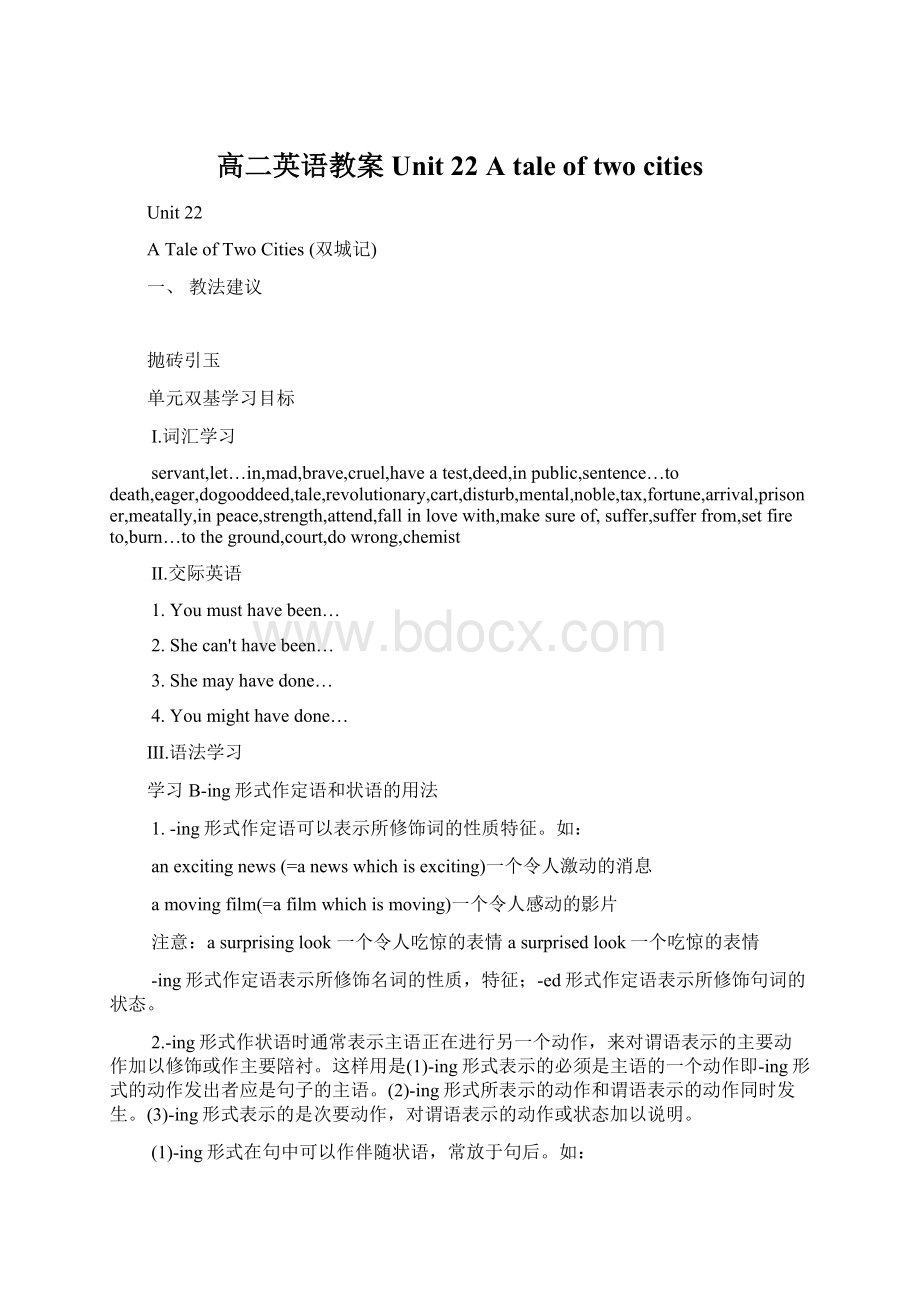高二英语教案Unit 22 A tale of two citiesWord文档格式.docx
《高二英语教案Unit 22 A tale of two citiesWord文档格式.docx》由会员分享,可在线阅读,更多相关《高二英语教案Unit 22 A tale of two citiesWord文档格式.docx(35页珍藏版)》请在冰豆网上搜索。

(2)-ing形式所表示的动作和谓语表示的动作同时发生。
(3)-ing形式表示的是次要动作,对谓语表示的动作或状态加以说明。
(1)-ing形式在句中可以作伴随状语,常放于句后。
Theysatinfrontofthebuilding,laughingandchatting.
Heworkedlateyesterday,preparingforthelecture.
(2)-ing形式可以做时间状语,常放在句首,如:
(When)Walkinginthestreet,Icaughtsightofatailor'
sshop.
(After)Finishingmywork,Iwentout.
(3)-ing形式可以做原因状语,常放句首。
如:
Beingill,hecan'
tgotoschool.
Notknowingheraddress,wecouldn'
tgetintouchwithher.
指点迷津
promise,admit,let,allow
请看试题:
Mothernevermybrothertogoswimmingintheriver.
A.promisedB.admittedC.letD.allowed
此题命得好。
所给四个选项均有较强的相互干扰性,增加了试题的难度。
其中let要求不带to的不定式作宾补,易排除。
选项promise,allow均可用于“wt.+宾语+todosth.”句型中。
Ipromisedhimtoattendtothematterpromptly.AllowmetointroduceMrXhang.但是,promise是较正式的书面用语。
admit不能用admitsb.todosth.句型结构。
admit表示“接受”、“允许”、“让某主享有”之意,一般用于admitofsth.结构中。
promise“允许”、“答应”,含有“保证”(许下诺言)和“有(良好的)前途或希望”之意(如:
答案给买一辆自行车)。
allow的意思侧重于“听任”或“默许”,也就是仅仅“不加阻止”。
是口语化的说法。
根据语意,上面试题的最佳答案应选D(allowed)。
二、学海导航
学法指要
单元要点词汇点拨
1.eager用作形容词,意为“渴望的,殷切期盼的;
热心的”。
其副词形式为eagerly,名词形式为eagerness。
例如:
Hewaseagerforsuccess.
Theyareeagertoseetheirdaughter.
Johnwaseagerforustocometotheparty.
Weareeagerthattheprojectshouldbestartedearly.
Theylistenedtothelecturewitheagerattention.
2.disturb常用作及物动词,意为“妨得,打扰(睡眠、工作等);
扰乱…,搞乱…;
使(人)心神不宁”。
Thenoiseinthestreetdisturbedmystudy.
TellmeifI'
mdisturbingyou.
Alightwinddisturbedthesmoothsurfaceofthelake.
Shewasdistubedtohearofhermother'
ssuddenillness.
3.fortunate用作形容词,意为“幸运的,运气好”,其名词形式为fortune,副词形式为fortunately。
fortunate后通常跟indoingsht.,todosth.或that从句。
Sheisfortunateinhavingagoodhusband.
I'
mfrotunatetohavgoodhealth.
Itwasfortunatethathewassavedbythepassingboat.
Fortunately,theyreturnedsafely.
4.suffer既可用作及用动词,意为“遭受(痛若、损害等)”;
也可用作不及物动词,意为“受苦,苦恼,患病,遭爱损害”例如:
Thecitysufferedseriousdamagefromtheearthquake.
Theysufferedagreatdealinthewar.
mpleasedtoknowthatyoudidn'
tsuffermuchpainwhileyouwereill.
Hishealthsufferedterriblyfromtheheavydrinking.
sufferfrom常用短语,意为“苦于……;
患……病”。
Thevillageissufferingfromdepopulation.
LastweekIsufferedabadcold.
5.doubt既可用作名词,也可用作动词,意为“怀疑”。
Ihavesomedoubtabouthiswords.
Thereisnodoubtofhissuccess.
Thereissomedoubtwhetherheisthebestmanforthejob.
Ihavenodoubtthathewillpasstheexamination.
Idoubtthetruthofthenews.
Idon'
tdoubtthatourteamwillwin.
单元词组思维运用
1.letin意为“让……进来”。
Youmustkeepthedoorclosed,don'
tletthedogin.
Windowsletinlightandair.
WillyoupleaseletMrSmithinbyopeningthedoor?
Hehasakeytothefrontdoorsohewillbeabletolethimslfin.
2.inpublic意为“公开地;
公然地;
当众地”。
It'
shadmannerstospitinpublic.
ThelittlegirldoesnotliketospeakEnglishinpublic.
Don'
tmakesomuchnoiseinpublic.
3.sentence...todeath意为“将……判处死刑”。
Themurdererwassentencedtodeathlastweek.
Therobberhasbeencaughtandwassentencedtothreeyears'
imprisonment.
4.taketheplaceof意为“代替;
取代”,这一短语也可以用takesb'
splace来代替。
Iwilltaketheplaceofyourteacher.
Electrictrainshavenowtakentheplaceofsteamonesinourcountry.
MrJohntakeyourmanagers'
place.
YourJohntakeyourmanagers'
Yourmanagerisveryill,soMrJohnistakinghisplace.
5.keepsilent意为“保持沉默”。
Whentheteacherquestionedthestudents,someofthemkeptsilent.
tkeepsilentwhenyouareaskedtoanswerthequestion.
6.fallinlovewith(=loseone'
sheartto)意为“爱上”。
Theyoungmanfellinlovewiththebeautifulgirlatfirstsight.
Hefellinlovewithherwhentheyworkedtogetherinthecountry.
Helikedthegirlbutdidn'
tfallinlovewithher.
7.makesureof+sth./doingsth.意为“将……弄确切;
确保……”。
Weshouldgetthereasearlyaspossibleinorderinordertomakesureofgettingaticketfortheconcert.
Willyoumakesureofhisreturn?
makesure+that-clause还可以作为一个句型掌握。
Ihaven'
tmadesurethatIwillwinthematch.
Pleasemakesurethatlightsareturnedoff.
Willyoumakesurethathereturned?
Makesurethatyoupickmeupatfive.
8.setfiretosth.(=setsth.onfire)意为“放火烧某物;
使某物着火”。
Theenemysetfiretothevillage.
(=Theenemysetthevillageonfire.)
单元难点疑点思路明晰
1.Theguardscouldn'
thavebeenwatchingverycarefully.卫兵不可能一直进行严密的监视。
【明晰】
(1)对于现在事件的否定推断,可用can'
t或couldn'
t加上动词be的不定式一般式。
child:
CanIhavesomesweets?
I'
mhungry.我可以吃一点糖果吗?
我饿了。
Mother:
Youcan'
t/couldn'
tbehungry.You'
vejusthaddinner.你不会饿的,你刚吃过饭。
(2)对于过去事件的否定推断,可以由can'
t+任何动词的不定式完成式来表示。
例如“couldn'
t+havebeen+v.-ing”是couldn'
t+不定式的完成进行式,表示“想必不可能一直在进行”的意思。
sverylatenow.Jackcan'
thavebeenwaitingatthebusstop.
Allthelightswereout.Theycouldn'
thavebeenworkinginthefactory
Shecouldn'
thavebeenwriting.SofarasIknow,shehasbeenillsincelastmonth.
(3)在其它时态中的用法。
Tom:
Amanansweredthephone.Isupposeitwasherhusband.
Ann:
Itcouldn'
thavebeenherhusband.He'
sbeendeadforages.
Whobroughtthegrandpianoupstairs?
Mary:
PerhapsitwasTom.
Hecan'
thavedoneitbyhimself.
2.Youmusthavebeenmadtospeaktotheservant!
你跟那个仆人讲话,准是发疯了!
(1)“musthave+过去分词”表示对过去情况比较肯定的推测,意为“准是”,“想必一定是”。
又如:
Shemusthavebeenveryyoungwhenshegotmarried.
Thegroundiswet.Itmusthaverainedlastnight.
Hemusthavecaughtacold.Shehadahighfeverlastnight.
(2)对现在情况的推测,用“must+动词不定式(不带to)”,如:
Marymustcatchacold,shehasahighfever.
Thismustbeyourroom.
ComradeLimustbeinthedormitorynow.
Youmustbejoking.
Hemustbeseventynow.
3.SheunderstoodwhatIwastalkingabout,eventhoughitwasthefirsttimewehadspokentogether.即使这是我们第一次在一起讲话,她也懂得我同她谈的道理。
(1)在下列表达方式之后,要用完成时:
it(this,that)isthefirst(second,third,fourth...)time...
it(this,that)istheonly...
it(this,that)isthefinest(worst,mostinteresting)...例如:
Itwasthefirsttimethatshehadsunginpublic.
Thisisthefirsttime(that)l'
vefeltreallyrelaxedformonths.
ThisisthesecondtimethatIhavemether.
Thisisthefourthtime(that)I'
veheardhersingthatsong.
Thisistheonlyparty(that)I'
veeverreallyenjoyedinmylife.
(2)现在时可以和forthefirsttime连用。
试比较:
ThisisthefirsttimeI'
vebeenhere.这是我头一次来这里。
(此句不能说……I'
mhere.)
mhereforthefirsttime.我是头一次来这里。
(3)itistime+动词不定式,这种句型表示“应该做某事了”。
stimetogotoschool(gotobed).
stimeforyoutogetabath.你该洗个澡了。
4.TheyhadcomefromEngland,havingheardthestrangenewsthatDrManette,Lucie'
sfather,wasaliveandwaslivinginParis,他们从英国来是因为听到了一个奇怪的消息——露西的父亲曼奈特医生仍然活着,而且住在巴黎。
(1)havingheardthestrangenews是现在分词的完成式,作表示原因的状语,相当于一个状语从句(astheyhadheardthestrangenews)。
在这个分词短语后面紧跟一个由that引导的同位语从句:
thatDrManette...inParis.
(2)现在分词的完成式是“having+过去分词”构成,它表示这动作发生在谓语动词所表示的动作之前,常用作状语,表示原因或时间。
Havingfinishedhiswork,hewenthome.
=Afterhehadfinishedhiswork,hewenthome.
5.DrManette,havingbeenkeptaprisonerintheBastille,Paris'
smostimportantprison,formanyyears,hadrecentlybeensetfree...曼奈物医生曾被当作囚犯关在巴黎最重要的监狱巴士底狱多年,最近获释了……
(1)这个句子的主语和谓语是:
DrManettehadrecentlybeensetfree,而havingbeenkeptaprisoner…formanyyears作状语,相当于一个表示时间的状语从句:
afterhehadbeenkept…formanyyears.
(2)“havingbeenkept…”是现在分词完成式的被动语态形式,它由:
"
havingbeen+过去分词”构成,表示:
“已经被……”的意思,在句中主要作状语,表示时间或原因。
LucieManette,havingbeentoldofthenews,becameexcitedanddecidedtostartforFranceimmediately.(=Aftershehadbeentoldofthenews,LucieManetteBecameexcited…)露西·
曼奈特得知这个消息之后,情绪很激动,决定立即起程去巴黎。
(作时间状语)
Havingbeentranslatedintomanylanguages,hisbooksoonbecamewellknownintheworld.(=Asithasbeentranslatedintomanylanguages,hisbookbecame...)他的书由于译成多种文字,很快就举世闻名了。
(作原因状语)
6.Thepoorofthecitiesandthepeasantsinthecountry,havinglivedsuchahardlifeforsolong,tookuptheirgunsandknivesandbegantokilltherichnobles.城市贫民和乡村里的农民由于长期以来过着非常艰苦的生活,拿起刀枪开始杀富有的贵族来了。
(1)thepoor=poorpeople.形容词前加一个定冠词the,则表示一类人或一类东西。
therich(富人),theyoung(年轻人),theold(老年人),theblind(盲人),thenew(新的东西),theordinary(普通的东西),theunusual(不寻常的东西)等。
(2)havinglivedsuchahardlifeforsolong是现在分词的完成式短语,作表示原因的状语,相当于一个状语从句:
astheyhadlivedsuchahardlifeforsolong.
句中的lived作“度过,过着”解,life是它的同源宾语。
在英语中有些不及物动词如live,die,sleep,smile,dream,fight,laugh等后面可有一个意义与它相同的宾语,这样的宾语叫作同源宾语。
Wearenowlivingahappylife.=Wearelivinghappily.
helivedtherestofhislifeintheUnitedStates.
Hediedaheroicdeathinthebattle.
Thelittlegirlsmiledasweetsmile.
Idreamedabeautifuldreamlastnight.
Atthiswelaughedaheartylaugh.
Shesanganicesong.
7.Onreadingit,hefoundthataservantofthefamilyinFrancehadbeenputinprison,throughnofaultofhisown.读完信后,他得知他法国家中的一名仆人本人没有任何罪过被关进了监狱。
(1)onreadingit